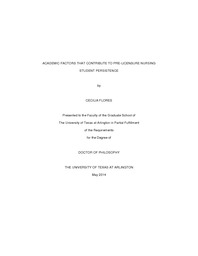
ATTENTION: The works hosted here are being migrated to a new repository that will consolidate resources, improve discoverability, and better show UTA's research impact on the global community. We will update authors as the migration progresses. Please see MavMatrix for more information.
Show simple item record
| dc.contributor.author | Flores, Cecilia | en_US |
| dc.date.accessioned | 2014-07-14T20:22:36Z | |
| dc.date.available | 2014-07-14T20:22:36Z | |
| dc.date.issued | 2014-07-14 | |
| dc.date.submitted | January 2014 | en_US |
| dc.identifier.other | DISS-12716 | en_US |
| dc.identifier.uri | http://hdl.handle.net/10106/24410 | |
| dc.description.abstract | The need for registered nurses is expected to grow exponentially in the next decade. As nurses retire and more Americans access the healthcare system, more than 400,000 nurses will be needed nationally (Auerbach, Buerhaus, &Staiger, 2011). Based on projections, by 2020, approximately 25,000 nursing students will need to graduate to the meet the state's need for nurses; in 2013, slightly more than 11, 000 candidates took NCLEX after successfully completing their nursing program (Texas Board of Nursing, 2014). Currently 70% of students admitted to a nursing program in Texas do not persist and graduate (Texas Higher Education Coordinating Board [THECB], 2006). To meet the increasing demand for nurses, identifying the essential academic supports that nursing students need to persist and graduate may increase the number of practicing nurses. A 14-item academic support tool was created to examine the association of academic support and pre-licensure nursing student persistence. Texas program deans and directors self-reported the academic support available to nursing students and their persistence rate in this descriptive correlational study. A persistence benchmark of 85% was set by the THECB (2006). Three types of support were evaluated: institutional support, pre-program support, and program support. Introductory courses that taught study skills and critical thinking skills, specialized lab that assisted with math skills, and the use of academic advisors prior to nursing school admission, as well as nursing faculty whose workload was student persistence in nursing school were associated with persistence. Conversely, when programs offered courses that taught test taking skills prior to nursing school and provided test prep sessions during nursing school, students were less likely to persist and graduate. Academic support contributed to nursing student persistence; interpretation of findings; implications for nursing education; and recommendations for future studies were reported. | en_US |
| dc.description.sponsorship | LeFlore, Judy | en_US |
| dc.language.iso | en | en_US |
| dc.publisher | Nursing | en_US |
| dc.title | Academic Factors That Contribute To Pre-licensure Nursing Student Persistence | en_US |
| dc.type | Ph.D. | en_US |
| dc.contributor.committeeChair | LeFlore, Judy | en_US |
| dc.degree.department | Nursing | en_US |
| dc.degree.discipline | Nursing | en_US |
| dc.degree.grantor | University of Texas at Arlington | en_US |
| dc.degree.level | doctoral | en_US |
| dc.degree.name | Ph.D. | en_US |
Files in this item
- Name:
- Flores_uta_2502D_12716.pdf
- Size:
- 1.534Mb
- Format:
- PDF
This item appears in the following Collection(s)
Show simple item record


